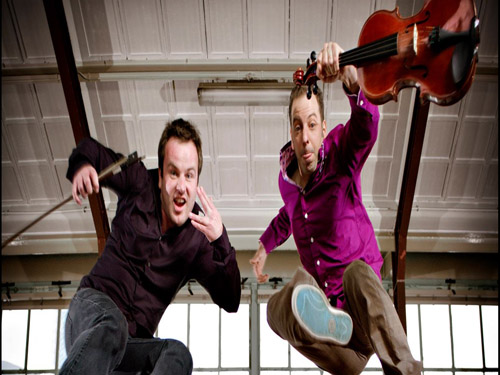Yesterday at the beautiful marble promenade in Al Azhar park, a huge crowd gathered for the opening of the Cairo International Circus festival, a two stage, two and a half week series of performances by circus troupes from Belgium to Palestine, organized by Al Mawred Al Thaqafy (and sponsored, in part, by Al-Masry Al-Youm).
Men on stilts and story-high unicycles cut through the swarm of people, mostly children, some perched on the shoulders of their escorts; even on these high chairs the kids could only see the silk-clad knobby knees of the stilts-walkers.
The show began with the Belgian troupe, Circus Baf, performing a series of dance-based acts. The first began as a fanciful showdown between a ballerina in red tights and short shorts (the kind that, in Egypt, are themselves a spectacle) and a juggler which quickly turned into an impressively acrobatic dance, choreographed, for comedic value one assumes, to a kind of bossanova remix of Danish pop group Aqua's atrocious 1997 hit, "Barbie Girl."
Dressed in a relatively understated fashion–like steam punks on laundry day–Circus Baf continued to blend dance, comedy and juggling, pausing only when an organizer took to the mic to chastise the churning crowds into sitting like a good audience. Which took some juggling.
One male performer, resembling a member of an old fashioned chain gang, mostly owing to the shackles around his wrists, took to the stage with his bowling-pin juggling colleague. Members of other troupes, recognizable in their array of grease paint and satin, milled around backstage while Circus Baf performed, privy, as Al-Masry Al-Youm was, to the secret behind the mid-act liberation of the circus performer’s hands from the handcuffs, which we will never reveal as long as we live.
After the first performance, the organizers painfully tried to put a cord to delineate an area for the swarming and excited public to sit in front of the stage. This partly worked, with most people complying and sitting on the once clean floor, surrounded by bottles of water and chips bags, while others tried to sneak in by almost sitting on other people’s laps.
Even though techno music was blaring and the spotlights were blinding the audience, the latter seemed apparently undisturbed, very used to the inconsiderate use of decibels. The second troop, I Baccala from Italy, started.
Two clowns, dressed in a very clown-like way with checkered socks up to the calves and round felt hats, reached the stage by passing through the dense crowd. Once on the wooden stage, their performance was slightly delayed by a very angry man yelling from one side of the stage to the other, who almost destroyed a camera on the spot. The two clowns, a man and a woman, reacted immediately by opening their eyes wide and pushing their arms forward as if to protect themselves from the man’s uncontrollable ire, and that’s how they gained the favors of the public, delighted by the diversion.
Their performance was thrilling and hilarious, with numerous acrobatics and jokes that revealed a great sense of acting. The two clowns, who clearly loved each other, constantly fought and atoned, and at some point the female clown jumped down the stage and started wandering with difficulty in the crowd, until she picked a man by the arm and led him on stage. Seemingly uncomfortable but still smiling, the tall, bearded man had to put up with the female clown climbing on his back and standing of his shoulders, while the crowd roared with laughter.
Eardrum-bursting techno filled the space as soon as the Italian performance was over, to keep the crowd entertained, and deaf. Unfortunately, the next performance by the British troop Electric Circus was a dire disappointment for adults and children alike.
Lacking aesthetics or professionalism, this troop of performers seemed amateurish, like kids at a school assembly. To top it off, they played with the concept of electricity and a horrible, distorted sound would regularly finish off the public already mistreated ears. The costumes were shabby, the make-up a junkie and the music bad, what we could still hear of it.



